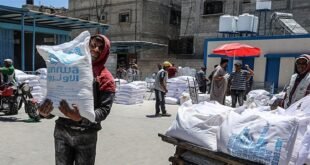22-02-2023
COLONIA MEZQUITAL: It had taken hours to cross the border from Honduras to Guatemala by bus, and Edwin Gomez, a 39-year-old migrant from Honduras’s capital, needed a place to rest for the night.
That’s how he found himself with Friar German Tax, walking slowly through Colonia Mezquital, a community 15 km (9.3 miles) south of Guatemala City. Their destination was a two-storey house, nestled along a narrow street.
 “I was told that there was a church where I could come and stay,” Gomez told media but shelters like the one where Gomez was headed are facing new threats in Guatemala. As migrants and asylum seekers journey north through Central America, with many headed to the United States, Guatemala has instituted reforms that could criminalize the work done by faith-based groups and volunteers to shelter and care for them.
“I was told that there was a church where I could come and stay,” Gomez told media but shelters like the one where Gomez was headed are facing new threats in Guatemala. As migrants and asylum seekers journey north through Central America, with many headed to the United States, Guatemala has instituted reforms that could criminalize the work done by faith-based groups and volunteers to shelter and care for them.
In January, the government began implementing new regulations that will require non-governmental migrant shelters to submit biometric information and other data for migrants who use their facilities daily. That data includes identification details, fingerprints, biographical material and other personal information.
Leaders from the Episcopal Conference of Guatemala, a branch of the Catholic Church, have raised concerns about the new regulations. Tax, the friar working in Colonia Mezquital, expressed outrage at the prospect of enforcing the new policy.
“That’s not possible,” Tax exclaimed, sitting in a chair in the entryway of the shelter. “If we did that, we would be losing the trust that migrants have in us because here migrants come and speak and tell their stories” but if shelters  like Tax’s fail to comply, authorities could use elements of the reforms made to Guatemala’s immigration law in February 2022 to pursue criminal charges against shelter personnel.
like Tax’s fail to comply, authorities could use elements of the reforms made to Guatemala’s immigration law in February 2022 to pursue criminal charges against shelter personnel.
The reforms target human smugglers known locally as “coyotes”, extending the maximum prison sentence for illegal trafficking to 30 years but due to ambiguity in the law’s language, the reforms could also be used to punish people who aid and support migrants and asylum seekers.
Under the new reforms, the label “trafficker” could be applied to anyone who facilitates a migrant’s stay and transit in Guatemala.
“We are not forcing them to migrate,” said Tax. “What we do is no more like receiving the brother or sister so they can rest, sleep a night in a bed, eat about two meals and continue on their way.”
The Catholic Church operates nine migrant shelters across Guatemala, which serve thousands each month, including the two-storey house in Colonia Mezquital. (Int’l News Desk)
 Pressmediaofindia
Pressmediaofindia




